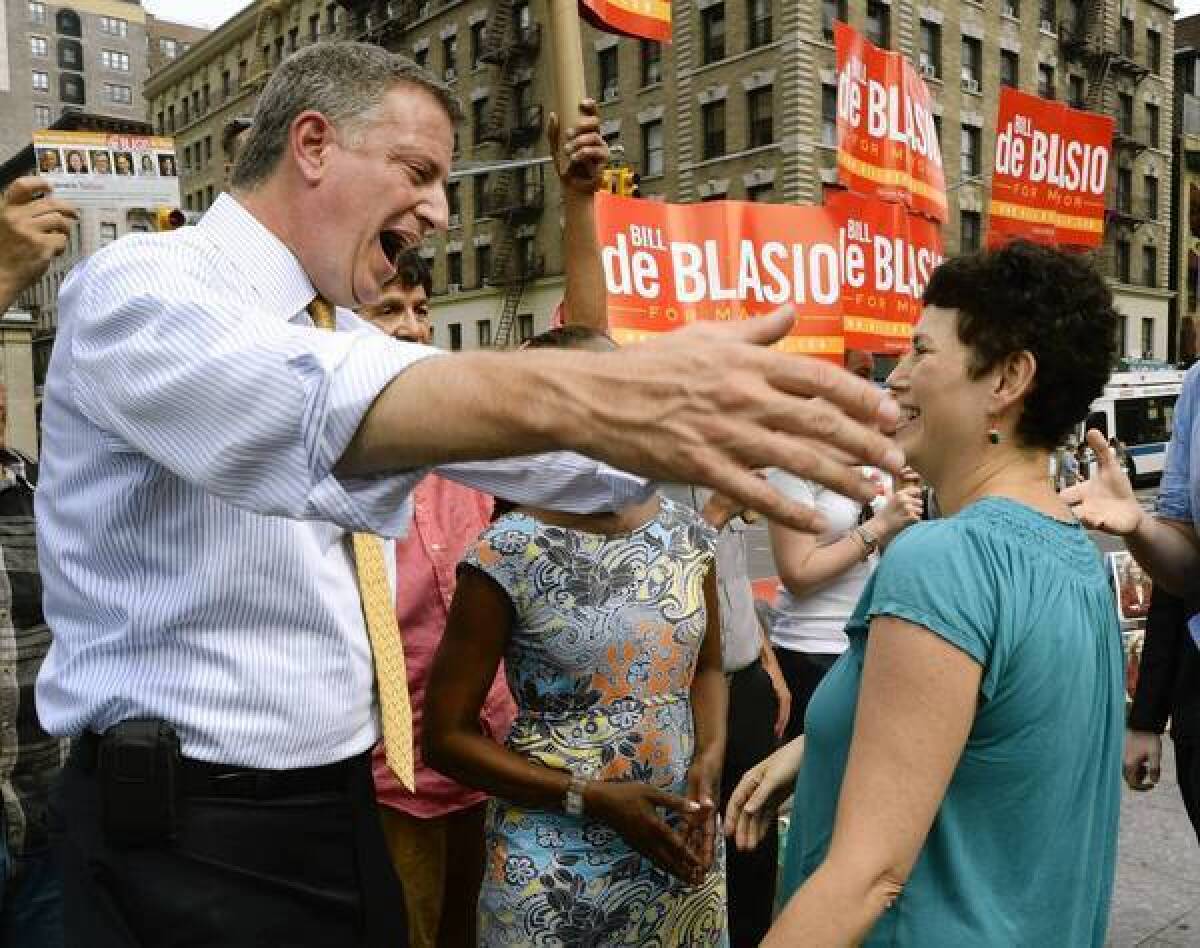New York Democrats poised to nominate Bill de Blasio for mayor

- Share via
NEW YORK — Weary of scandal and swayed by promises of a better future for residents being priced out of the city, voters on Tuesday rejected former Rep. Anthony Weiner’s bid for a political comeback and threw their support behind the liberal public advocate Bill de Blasio to be the Democratic candidate for mayor.
It was not clear late Tuesday whether De Blasio would capture the 40% of votes needed to avoid a runoff with the second-place finisher, former city Comptroller William Thompson Jr.; De Blasio danced around the necessary figure as returns trickled in showing him easily outdistancing the field. City Council Speaker Christine Quinn was in third place, followed by the current city comptroller, John C. Liu, who was vying to be New York’s first Asian America mayor. Weiner was trailing in single digits.
The Democratic nominee will face Republican Joseph Lhota, the former Metropolitan Transportation Authority chief, in the November election to succeed Mayor Michael R. Bloomberg. Lhota defeated billionaire businessman John Catsimatidis by more than 10 percentage points to avoid a runoff.
Just as they shunned the sexting Weiner, whose online philandering cost him his congressional seat in 2011, voters also rejected another scandal-plagued candidate, former Gov. Eliot Spitzer. Spitzer, who resigned as governor in 2008 after being caught patronizing prostitutes, narrowly lost his fight with Manhattan Borough President Scott Stringer to be the Democratic nominee for city comptroller.
The results in the mayoral primary, the first step toward choosing a successor to Bloomberg, underscored the appeal of De Blasio’s message to middle-class New Yorkers, who he said had suffered under the billionaire mayor’s 12 years in office. Throughout the campaign, De Blasio portrayed himself as the candidate who could offer a clean break from the Bloomberg years, which he said had turned New York into a “tale of two cities,” with all but the richest residents struggling to get by.
De Blasio also won over liberal voters as he condemned the police department’s stop-and-frisk policy — which critics say targets black and Latino youth — and used TV ads to emphasize his multiracial family. De Blasio, who is white, is married to a black woman. TV ads featuring his son, Dante, struck a chord with voters who saw the teenager as an example of those caught up in the stop-and-frisk practice because of their skin color.
“The work you did at the grass roots is why we’re here tonight,” De Blasio told supporters gathered outside his election party in Brooklyn on Tuesday night. But he indicated that he expected a runoff, saying, “We’ve got a lot of work ahead.”
The voting marked the end of a rollicking campaign with a shifting array of front-runners and issues that ranged from civil rights to kitten rights.
At one point, Lhota questioned the wisdom of transit officials shutting down a portion of a subway line for two hours to save two kittens lost on the tracks, prompting criticism from Catsimatidis and forcing Lhota to declare in their final debate, “I never said I wanted to kill a cat.”
All of the candidates portrayed themselves as champions of the middle class and promised more jobs, better schools and more affordable housing in a city where the average apartment rents for more than $3,000 per month. Their opinions on policing tactics and on Bloomberg’s legacy set them apart and took center stage in debates and forums after being briefly overshadowed by the raunch factor that accompanied Weiner’s late arrival in the race.
Weiner announced his candidacy in May, about two years after revelations of his sexting with various women forced him to quit his 9th Congressional District seat. He soared in the polls initially but began losing support in July after admitting that he had pursued online relationships with women other than his wife even after resigning from office and entering rehab to salvage his career and marriage.
Even as he conceded defeat, Weiner insisted that his ideas were sound and his campaign strong. “There’s no doubt about it: We had the best ideas,” Weiner said, adding that he never considered quitting even as his sexting issues came back to haunt him. “Sadly, I was an imperfect messenger.”
Underscoring his inability to escape his past, one of Weiner’s former sexting partners, a woman named Sydney Leathers, showed up at his election party, some local media reported.
Quinn suffered from her close association with Bloomberg, particularly for having supported extending mayoral term limits to let Bloomberg run for a third time in 2009. She was the only Democrat to say she would keep on Police Commissioner Ray Kelly, and she was less critical of stop-and-frisk policing tactics championed by Kelly than her rivals.
Quinn said her more than 12 years in city government gave her the experience needed to head the nation’s largest city, and as she voted with her wife, Kim Catullo, by her side, Quinn dismissed the polls showing her in third place.
“You can’t really believe public polls,” Quinn said. “I always knew this was going to be a fight to the end.”
Hours later, Quinn, who had hoped to become the city’s first female and first openly gay mayor, conceded defeat. “I’m obviously disappointed by the results,” she said as Catullo and her family stood behind her. “But I gotta tell you … all you guys couldn’t make me more optimistic about the future of our city.”
De Blasio soared into first place in recent polls just weeks after lagging behind Quinn and Weiner, helped in part by Weiner’s implosion and by TV ads that began airing in mid-August.
More to Read
Sign up for Essential California
The most important California stories and recommendations in your inbox every morning.
You may occasionally receive promotional content from the Los Angeles Times.











